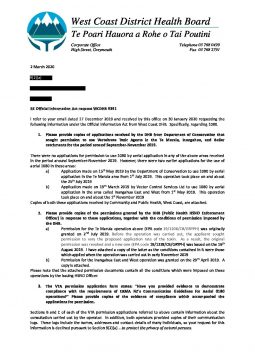RE Official Information Act request WCDHB 9391
I refer to your email dated 17 December 2019 and received by this office on 30 January 2020 requesting the following information under the Official Information Act from West Coast DHB. Specifically, regarding 1080.
1. Please provide copies of applications received by the DHB from Department of Conservation that sought permission to use Vertebrate Toxic Agents in the Te Maruia, Inangahua, and Buller catchments for the period around September-November 2019.
2. Please provide copies of the permissions granted by the DHB (Public Health HSNO Enforcement Officer) in response to these applications, together with the conditions of permission imposed by the DHB.
3. The VTA permission application form states: “Have you provided evidence to demonstrate compliance with the requirements of ERMA NZ’s Communication Guidelines for Aerial 0180 operations?” Please provide copies of the evidence of compliance which accompanied the applications for permission.
4. Please state how the Public Health HSNO Enforcement Officer verified the statements made by the applicant. Or did the DHB officer accept the statements at face value?
5. Did the Public Health HSNO Enforcement Officer or other DHB officer attend and observe the operation?
6. The West Coast DHB gave permission for a poisoning operation that has appalled the public. Marine creatures harvested by the public were found dead amongst poisoned rats at the mouth of the Buller river, indicating that human health was not protected by the DHB’s conditions of permission. Do you consider that the DHB should not be party to permitting the use of Vertebrate Toxic Agents which have the capacity to harm human health by the way they are being used?

